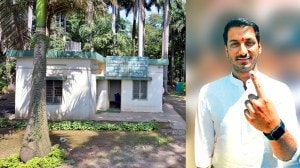Ananthakrishnan G. is a Senior Assistant Editor with The Indian Express. He has been in the field for over 23 years, kicking off his journalism career as a freelancer in the late nineties with bylines in The Hindu. A graduate in law, he practised in the District judiciary in Kerala for about two years before switching to journalism. His first permanent assignment was with The Press Trust of India in Delhi where he was assigned to cover the lower courts and various commissions of inquiry. He reported from the Delhi High Court and the Supreme Court of India during his first stint with The Indian Express in 2005-2006. Currently, in his second stint with The Indian Express, he reports from the Supreme Court and writes on topics related to law and the administration of justice. Legal reporting is his forte though he has extensive experience in political and community reporting too, having spent a decade as Kerala state correspondent, The Times of India and The Telegraph. He is a stickler for facts and has several impactful stories to his credit. ... Read More
SC brings back question mark over Bihar elections
Uncertainty over the holding of fresh Assembly elections in Bihar was revived today with the Supreme Court indicating that the poll process ...

Uncertainty over the holding of fresh Assembly elections in Bihar was revived today with the Supreme Court indicating that the poll process would be subject to the outcome of the petition pending before it challenging Governor Buta Singh’s decision to dissolve the state Assembly.
This was made evident by a five-judge Constitution Bench of Justice Y K Sabharwal, Justice K G Balakrishnan, Justice Arijit Pasayat, Justice B N Agrawal and Justice Ashok Bhan which also said that the immunity available to Governors under Article 361 of the Constitution would not extend to their actions, which were prima facie malafide.
What this means is Buta Singh’s two reports—dated April 27 and May 21—leading to the dissolution would now be closely scrutinised by the court in the light of allegations of malafide, but in his absence before the court. It will be up to the Centre to defend the action.
The court was hearing arguments on the question of naming Buta as a party in the petition filed by some MLAs of the dissolved assembly.
As the petitioners had also sought a stay on the elections, the counsel for Election Commission requested the court to clarify the situation to avoid confusion as it had already announced the poll dates.
The court then asked: ‘‘What if we quash the Presidential proclamation dissolving the state assembly?’’
Taken aback, the EC counsel replied: “Once the poll process started, no court can interfere with it.” This prompted the bench to warn, ‘‘In that case, we will seriously have to consider staying the elections.”
It was then left to the other counsel to mollify the court saying that if the proclamation was quashed, the poll schedule too would stand annulled.
Consequently, the bench decided against staying the elections, but advanced the hearing on the petition to September 20 so as to settle the issue well ahead of October 18, the first scheduled poll date.
On the question of issuing a notice to the Governor and making him a party to the proceedings, the court decided that a “harmonious construction” of the constitutional provisions was more appropriate.
It said that the Governor’s actions could still be subject to judicial scrutiny, if prima facie malafide, though without making him a party in view of the immunity available under Article 361 of the Constitution.
“Immunity under Article 361 does not mean that in the absence of the Governor, malafide act cannot be examined by the court”, the Bench said.
However, whether there was any malafide in the actions would be addressed later, it said.
Attorney General Milon Bannerjee had expressed similar views earlier saying the allegations of malafide could be scrutinised without issuing notice to the governor and that his actions would be defended by the Centre.
Hearing him, Justice Sabharwal warned that the Centre should not come up later with the argument that it cannot defend the decision in the absence of the Governor.
Today, the Attorney General also tried to address the controversy regarding the different stance taken by him and the Additional Solicitor Genial and said there would be no two voices on the matter.



- 01
- 02
- 03
- 04
- 05





























